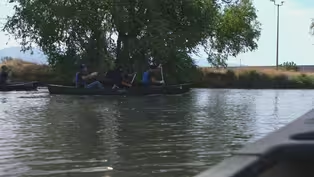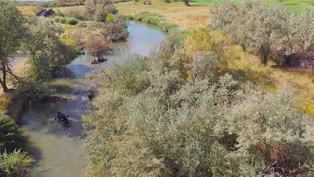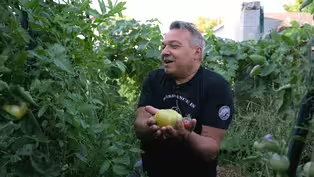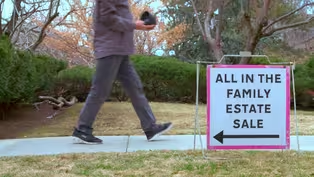
In Your Backyard
Season 3 Episode 2 | 26m 46sVideo has Closed Captions
Explore the neighborhood with the Punk Rock Farmer, the Jordan River, and an estate sale.
Utahns are known for traveling far and widein search of adventure, but sometimes the greatest adventures can be found close to home. We’ll examine three stories of stopping to smell the roses, with Punk Rock Farmer Aldine Grossi, theteens and local organizations working to clean the Jordan River,and the meaning of objects as a reflection of their owners with All in the Family Estate Sales.
Problems playing video? | Closed Captioning Feedback
Problems playing video? | Closed Captioning Feedback
This Is Utah is a local public television program presented by PBS Utah
Funding for This Is Utah is provided by the Willard L. Eccles Foundation and the Lawrence T. & Janet T. Dee Foundation, and the contributing members of PBS Utah.

In Your Backyard
Season 3 Episode 2 | 26m 46sVideo has Closed Captions
Utahns are known for traveling far and widein search of adventure, but sometimes the greatest adventures can be found close to home. We’ll examine three stories of stopping to smell the roses, with Punk Rock Farmer Aldine Grossi, theteens and local organizations working to clean the Jordan River,and the meaning of objects as a reflection of their owners with All in the Family Estate Sales.
Problems playing video? | Closed Captioning Feedback
How to Watch This Is Utah
This Is Utah is available to stream on pbs.org and the free PBS App, available on iPhone, Apple TV, Android TV, Android smartphones, Amazon Fire TV, Amazon Fire Tablet, Roku, Samsung Smart TV, and Vizio.
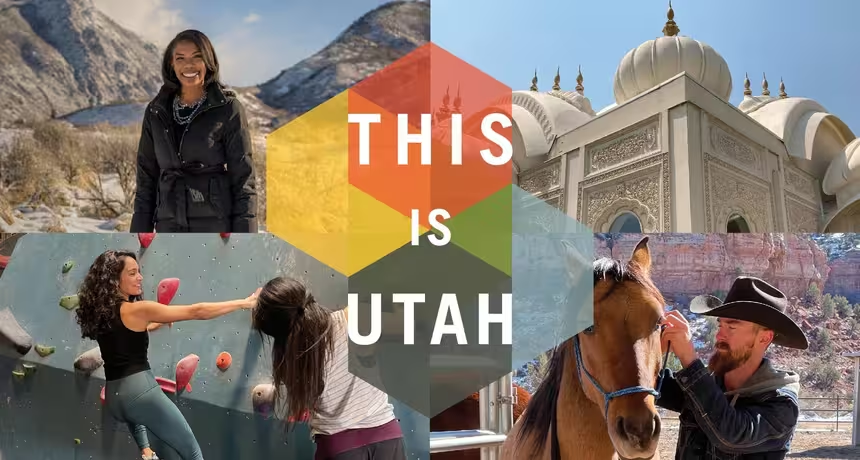
This is Utah
Liz Adeola travels across the state discovering new and unique experiences, landmarks, cultures, and people. We are traveling around the state to tell YOUR stories. Who knows, we might be in your community next!Providing Support for PBS.org
Learn Moreabout PBS online sponsorship(soft tones) - Welcome to This is Utah.
I'm your host, Liz Adeola.
Over the past few months, many of us have had plenty of time to explore adventures in our own backyard, from this urban waterway that's getting a lot more use and a lot more care to this estate sale, where we learn the stories behind precious items up for grabs.
We'll also peer into the world of a local music legend who is helping his community reconnect with its organic roots.
- [Announcer] Funding for This is Utah is provided by The Willard L. Eccles Foundation, The Lawrence T. And Janet T. Dee Foundation and the contributing members of PBS Utah.
Thank you.
(upbeat music) - [Liz] During these uncertain times, local music legend Aldine Grossi, the Punk Rock Farmer, reminds us of the importance of grounding ourselves and what matters most, unity, music and rich soil.
Follow Al as he connects us to his passions and the people growing healthy, organic, local food.
- The peppers are going off now, too.
The best food is grown when you pick it from the vine and go in the house and cook it.
These are Brazilian eggplants, Brazilian Orange, and they're really tasty.
It's really cool when you slice it like this.
(upbeat music) Lots of stuff growing right now.
It's a really great time of year.
It's August and so many things are coming in.
One thing that my garden, people make dishes, they follow recipes.
I make recipes out of what's growing in my garden.
These great seeds and great plants that are certain recipes.
I'll talk food because I love food.
When you see me post something, it's because this is gonna go great with this.
I'm a cook, I'm not a chef.
My mom and dad were Italians, we cook.
Here's the Italian ones, and these are called meselunga.
I'm an advocate for eating local and growing organic food, and I want to get folks excited, too.
Growing food in your backyard and keeping it simple, what a great feeling.
(punk music) I played in punk rock bands around here in Salt Lake in the mid-80s, and we had the Indian Center, and our friend from Raunch Records, Brad Collins, was bringing all these bands, and all the big bands, like Discharge and the Subhumans and the Dead Kennedys and Black Flag, and all the local bands from around here, we got to play with those guys.
So there was a huge scene here in Salt Lake.
The anti-establishment and anti government and all that kind of stuff, the stuff that has that kind of message, conflict and discharge, that stuff changed my way of thinking, it really did.
- Rolling.
This is called War.
We feel we really need to still say this stuff.
This music really is trying to provoke awareness, man.
- [Al] You know, I might not have the teenage angst anymore, but I still play in bands and I still have a punk rock band.
- Welcome to Radioactive, a show for grassroots activists and community builders weeknights at six here on KRCL.
I'm Laura Jones.
It's Friday night, means Aldine Strychnine, KRCL's Punk Rock Farmer is in the KRCL studios with me.
Hey, Al.
- Hey.
It's very nice to be here.
You know, it's really cool because in the last five years I've been doing this Punk Rock Farmer thing on the radio.
Nutrient-dense food is the thing that we're talking about these days.
And I've met so many folks, and I've gravitated towards the folks that are doing the all year round growing and the folks who grow and the local farmers.
I've been hobnobbing with them for the last five or six years, and really get down into what's going on in the growing community.
Everyone wants you to do as best you can and grow more food for more people as much as you can.
Wasatch Community Gardens, their ethos is grow healthy food, grow, eat, repeat.
It's one of the really most prolific urban farms in the city.
Really, as soon as I walk inside, I look around and I see the expanse of this place and how many different varieties of things are growing.
- We have 18 community gardens around the city right now.
We're working with dozens of schools.
We have our community education program that's teaching adults.
We're trying to get out there and just help people grow and enjoy healthy, organic, local food.
The Green Phoenix Farm kind of fits into that greater Wasatch Community Gardens network, and here we provide paying jobs for women experiencing homelessness, as well as working with single mothers, helping them break the cycle of poverty.
These two things together are our farm-based job training program.
- They teach you how to survive in the world and how to be able to get through things.
You wouldn't believe that there's something like this here in the middle of downtown Salt Lake, especially with the zen we got here.
Now I've got a purpose in life, but I've learned that a little bit of nourishment, everything will grow and blossom, including people.
- [Al] Urban farming is quite a big movement.
It kind of goes against the grain of things.
It's kind of a punk rock kind of a thing, because it's against what people might think that you should be doing or would be doing.
You can grow wonderful organic food right here in the city.
Before World War II, there were no supermarkets, so that means that people either grew it in their yard or went to a farmer's market somewhere, and that's all there was.
These days I try to just focus on growing what I can and going to the farmer's markets.
- We used to weigh the mozzarella.
- Sundays, we try to keep up a tradition of sitting at the table and eating Italian food like we did when we were kids.
When I was a kid and my grandfather was still alive and he only spoke Italian, we ate at the table every night, and there was wine at the table every night.
There was a salad that came out at the end after you ate your meal every night.
My mom would yell, mangia, mangia, come and eat.
Where the seed was planted was by my dad back in New York.
We had animals that we raised, put in the freezer and grew our own food in the garden.
Let it drown in the sauce.
Tonight we're having tomatoes from the garden.
It's Abruzzese, it's a small town in Italy.
The veggies came from my garden and the farmer's market, and the pork shoulder from a local farmer down in Provo.
Folks, you own a piece of Mother Earth.
It's out your back door, and you can grow amazing food on your little piece of the Earth.
Not only are we regenerating the Earth, but we can regenerate ourselves.
I get a great feeling whatever the garden, and I want you to have it, too.
(punk music) (soft music) - We are here at the Jordan River, and if you take a close look, there are some areas that have been neglected for quite some time, but a renewed demand for natural spaces that provide a getaway has launched a new appreciation for this urban waterway.
(soft music) - [Juan] I'm indigenous, and in my culture, rivers to Mother Earth are like veins in my body.
If I don't keep my veins clean, my blood clean, I'm not a healthy person.
Same thing with Mother Nature.
If we don't keep our rivers clean, Mother Earth is hurting.
- This is our community.
This is where our people are, and this is where we live.
We drive around here every day, and so I think that, especially as a youth, if we're going to do community service, we should do it in our community to help and support our people.
- I'm with PATHS, and we partner with Hartland community.
We do a lot of events like this, cleaning up.
Today we're gonna be going out on the canoes and cleaning up the Jordan River.
- You're gonna have so much fun.
You're gonna want to do this all day.
Have fun, you got it.
- Not like I read my community so hard, but I do, I think that especially West Valley and this area, just 'cause there the minority is no longer the minority.
I'm surrounded by people who look like me, and then when we all get together and we do community service like this and we clean up the river, or the the park across there, we planted trees.
It's a really good outlet for us just to kind of keep us on the right path but allow us to have fun at the same time, 'cause we could definitely be off doing something that's not gonna help us.
- 28 years ago, I came to live in the West Side and I saw the lack of focus on behalf of the higher authorities on these people.
I have openly said it.
We serve the underserved.
We work with children that don't want to be worked with.
We welcome anybody.
- Everyone now paddle on the right, and the person in the back, use your paddle as a rudder to steer.
Not that way, the other way.
We love to see young people getting involved and taking ownership, and so we try and encourage and support youth that come out to volunteer and do things like plant trees, re-establish native plants, pick up litter and trash and things like that.
You can see smiles on their faces to be engaged and feel like they're doing something positive for their community.
- There's trash back over there.
Six o'clock, six o'clock.
- I've been here a few times with my family and we've had activities over there at the park.
I never knew that it was this bad.
- [Miguel] Shopping carts, sometimes tires, a lot of bottles, glass bottles, plastic bottles.
It affects everything.
It affects the wildlife here, the plants.
It looks bad for the community.
- There's a lot of impacts on water quality and litter and debris in the river.
The visible trash and debris that you see mostly comes from stormwater.
Whatever's in the curb and gutter or in the parking lot when the rains and the winds blow or the rains fall and snow melts, those things just get flushed down the system and they end up in the river.
It does seem overwhelming, but the passion and dedication of volunteers is just incredible.
You go back a day after they've done a cleanup and you're like, there's hardly anything there.
You know there'll be more the next time there's a wind storm or a rainfall, but for a moment in time, you can see what the magic of the river is when it's clean.
(soft music) - There is only like 20, there's like 20 kids here today, and we cleaned up so much.
We have bags and pounds of trash, and we were only here for an hour.
In that small amount of time that we spent, we covered so much ground and we got so much done.
Whether you're by yourself or whether you're with a big group of people, anything helps.
Even though we might not know it, the trash that we have could inevitably end up, eventually end up here along the banks and then the animals that are here and everything are affected by it, and so I think that we should all be a little bit more conscious about what we use and where our trash goes.
- This is an interesting river.
It's about 50 miles in length.
It flows from Utah Lake to the Great Salt Lake, connecting Utah's two largest bodies of water.
It also flows through the most urbanized part of the state.
There are probably a million and a half people, which is about half the population of the state, that live within about 10 to 15 minutes of the Jordan River.
There's a really important role that the river still plays as a gathering place, as a feature to allow people to get out of the hustle and bustle of the city and to connect with the natural world around them.
There's a lot of research and information about the importance of being in nature to our emotional and physical health.
The river is a very nearby connection to get some of that, to see a great blue heron or a kingfisher or a hawk or beaver or deer just outside your backyard or just down the street from where you live.
It is very accessible, and we want it to just become this magic place where people can get away and help their emotional and mental health and get out and do something active.
(soft music) - I long to see this Jordan River more clean.
I long to see all these little banks right here that are open with little tables and chairs where you can come and picnic.
What do you teach your kids?
Here you could teach them to catch and release that they could go do in the ocean or somewhere else.
Here you could teach him how to paddle a canoe, how to paddle a kayak.
Here you keep them busy cleaning up.
- It's awesome to be able to drive by and be like, oh, that tree, I planted that tree, and I named it.
I cleaned up this river and I planted those gardens.
I'm prideful, and I'm very proud of us, and especially this group of kids because we all have that mindset where this is our community and we need to give back because these are our people.
We should be supporting those in our community, and we all have that mindset and it's great to be able to get with other people like me, to be able to think that same way and then do it.
It's awesome.
(soft music) - Our homes contain the stories of our lives.
We hold memories and meaning in the items we collect.
But what happens when those stories end?
From old puzzles to antique furniture, we found characters who help write the next chapter.
(gentle music) - I love to go estate sales because it's like treasure hunting.
It's a hobby that my friend and I do very regularly.
- It's kind of a sensitive line.
I mean, you're having fun and you're going through and you're rifling through, and then you come across all those monogrammed napkins and it just kinda goes ooh, this isn't just a fun weekend.
This is kind of someone's home.
- My favorite part is just walking through the house and seeing all of the stuff and kind of learning about the person that lived there just by their stuff.
- There's all sorts of people waiting in line every week.
I know probably the first 50 of them by name, and I direct them to which area they should go.
An estate sale is more than a garage sale.
It's the department store of someone's life, and these are the treasures that someone's collected and put on their shelves and displayed for their friends and family to see.
(soft music) - My parents, Irene and Fred, lived here for 40 years.
It's sort of stunning what they amassed, as people do, my mother particularly because she loved clothes and she took very good care of them.
There are clothes here from, oh, at least 70 years of her life.
She modeled for 62 years.
She also did in-store modeling at Nordstrom's.
She did billboards.
My mother was a 47 year breast cancer survivor.
She saw herself as being a model in both senses of the word for younger women and trying to help empower them in who they were and are.
(soft music) - We provide a great service for people.
People usually have a death in the family.
They're very sad, they're very distraught.
They don't know what to do with a whole house full of things, and people don't have time to deal with it themselves.
It's hard when people don't want to let go of things, and I try to make sure that they're ready to let go.
We have the family go through the home, keep all the things that are important to them, sentimental, and take anything they want out of the home.
And then we come in and organize it and sell what's left.
We come in and out of a person's home in a week.
Come on in.
In my business, people want collections, so there's so many people besides the people that come for, they want some new pots and pans or they might need a couch.
People come looking for things like baseball cards or costume jewelry 'cause they have a collection and they want a bigger collection, or they want to find that $1 million object.
They want to find that Tiffany bowl.
(soft music) We did the sale recently for a woman named Valene who used to be a doll collector in Salt Lake City.
I had met her.
She used to come to my estate sales and buy lots of things.
She actually repaired a doll for me at one point.
(soft music) - During the depression, my mother told me she didn't have any toys.
This is Alice in Wonderland, never been out of the box.
Super cute little thing.
It was my mother's passion, and she started when she was a little girl.
She missed an opportunity to win a Shirley Temple doll, and so when she grew up, she got a Shirley Temple doll and then began to collect.
It just makes me feel connected to my mom.
We're trying to make sure that we keep track of them and give them to the right homes and sell them to people who appreciate their value.
(soft music) - We were up in Centerville once and this woman had lived through the depression, and in her bathroom cabinet was a little Bayer children's aspirin bottle.
There was a note inside, and I took the note out and it said, pieces of string too small to use.
I asked her daughter what she was gonna do with it.
She said her mother was saving it in case she ever had to tie them all together and make a piece of string to use for something.
But she had put this note in there, and that was her daughter's favorite possession.
(soft music) That's a great piece.
Things have stories, they have memories.
Things did have meaning to people.
I still think the important thing is that it's being carried on, that it's being meaningful to people again.
Come on in.
Thanks for coming out today, everybody.
- When people come through the house who didn't know my parents, I hope they'll somehow embrace their spirit of kindness and generosity, that they feel that they're part of community, 'cause my parents were very much, it was all about community.
They loved meeting new people, and my father would probably, in a way, would be at the door to greet them and welcome them in, probably offer them a drink.
Somehow I have this vision of them just being like, you know, sitting down in a chair and saying, so here, tell me about yourself.
(gentle music) I'll miss everything.
I'll miss our quiet talks at the kitchen table early in the morning.
(gentle music) There's a memory attached to so many things in this house, but objects are just objects, and my memories can't be taken away and they don't belong to the objects and the objects don't belong to me.
(gentle music) - [Sue] Every week's a different story.
It's a different family dynamic, and when I leave the house and it's empty, I look around and I'm happy and I'm proud because I've done my job.
I look at it all as it's being recycled.
In the end, you're gonna leave a house full of treasures, stuff and treasures to be moved on to someone else.
- With so much to explore, what are you waiting for?
This is Utah's on Facebook, Instagram and YouTube.
Check us out online for behind the scenes photos, or watch videos On Demand.
Until next time, I'm Liz Adeola, and This is Utah.
- [Announcer] Funding for This is Utah is provided by The Willard L. Eccles Foundation, The Lawrence T. And Janet T. Dee Foundation and the contributing members of PBS Utah.
Thank you.
(upbeat music)
Preview: S3 Ep2 | 30s | Explore the adventures happening in our neighborhoods on this week's This Is Utah. (30s)
Video has Closed Captions
Clip: S3 Ep2 | 8m 6s | Meet a group of teenagers & local organizations who are cleaning up the Jordan River. (8m 6s)
Video has Closed Captions
Clip: S3 Ep2 | 7m 58s | Aldine “Al” Grossi shows us how Utahns can grow organic, local food in an urban space. (7m 58s)
Video has Closed Captions
Clip: S3 Ep2 | 7m 59s | See how objects can be a reflection of their owners with All in the Family Estate Sales. (7m 59s)
Providing Support for PBS.org
Learn Moreabout PBS online sponsorshipSupport for PBS provided by:
This Is Utah is a local public television program presented by PBS Utah
Funding for This Is Utah is provided by the Willard L. Eccles Foundation and the Lawrence T. & Janet T. Dee Foundation, and the contributing members of PBS Utah.


